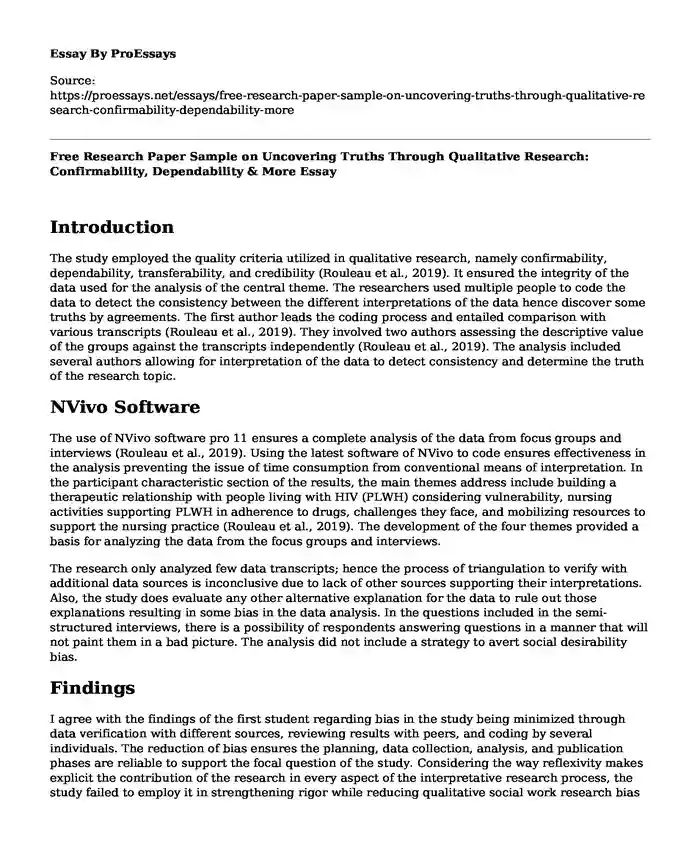Introduction
The study employed the quality criteria utilized in qualitative research, namely confirmability, dependability, transferability, and credibility (Rouleau et al., 2019). It ensured the integrity of the data used for the analysis of the central theme. The researchers used multiple people to code the data to detect the consistency between the different interpretations of the data hence discover some truths by agreements. The first author leads the coding process and entailed comparison with various transcripts (Rouleau et al., 2019). They involved two authors assessing the descriptive value of the groups against the transcripts independently (Rouleau et al., 2019). The analysis included several authors allowing for interpretation of the data to detect consistency and determine the truth of the research topic.
NVivo Software
The use of NVivo software pro 11 ensures a complete analysis of the data from focus groups and interviews (Rouleau et al., 2019). Using the latest software of NVivo to code ensures effectiveness in the analysis preventing the issue of time consumption from conventional means of interpretation. In the participant characteristic section of the results, the main themes address include building a therapeutic relationship with people living with HIV (PLWH) considering vulnerability, nursing activities supporting PLWH in adherence to drugs, challenges they face, and mobilizing resources to support the nursing practice (Rouleau et al., 2019). The development of the four themes provided a basis for analyzing the data from the focus groups and interviews.
The research only analyzed few data transcripts; hence the process of triangulation to verify with additional data sources is inconclusive due to lack of other sources supporting their interpretations. Also, the study does evaluate any other alternative explanation for the data to rule out those explanations resulting in some bias in the data analysis. In the questions included in the semi-structured interviews, there is a possibility of respondents answering questions in a manner that will not paint them in a bad picture. The analysis did not include a strategy to avert social desirability bias.
Findings
I agree with the findings of the first student regarding bias in the study being minimized through data verification with different sources, reviewing results with peers, and coding by several individuals. The reduction of bias ensures the planning, data collection, analysis, and publication phases are reliable to support the focal question of the study. Considering the way reflexivity makes explicit the contribution of the research in every aspect of the interpretative research process, the study failed to employ it in strengthening rigor while reducing qualitative social work research bias (Mackieson et al., 2019).
Furthermore, I support the second student elucidation that the focus group nurses were excluded from the sample so that they are not counted twice and skew the sample, preventing biased conclusions. Ensuring the sample selection is not askew allows the research results to be free from bias, and the sample is a true representative of the population. It eliminates any instances of sampling error and offers equal odds for the participants in the study.
Conclusion
To conclude, the focus group strength contained health care professionals who are well conversant with HIV and were involved in HIV informational, which ensures data is obtained from the purposely selected sample. Their experience is invaluable in providing proper engagement in the group discussions and becoming a tool or equality in the group. The experience also allows them to interact and relate with the participants. They offer alternatives for disagreement and contradictions in the research process.
References
Mackieson, P., Shlonsky, A., & Connolly, M. (2019). Increasing rigor and reducing bias in qualitative research: A document analysis of parliamentary debates using applied thematic analysis. Qualitative Social Work, 18(6), 965-980.
https://doi.org/10.1177/1473325018786996
Rouleau, G., Richard, L., Côté, J., Gagnon, M., & Pelletier, J. (2019). Nursing practice to support people living with HIV with antiretroviral therapy adherence. Journal of the Association of Nurses in AIDS Care, 30(4), e20-e37.
https://doi.org/10.1097/jnc.0000000000000103
Cite this page
Free Research Paper Sample on Uncovering Truths Through Qualitative Research: Confirmability, Dependability & More. (2023, Oct 12). Retrieved from https://proessays.net/essays/free-research-paper-sample-on-uncovering-truths-through-qualitative-research-confirmability-dependability-more
If you are the original author of this essay and no longer wish to have it published on the ProEssays website, please click below to request its removal:
- Quantitative, Qualitative and Mixed Methods - Selecting a Research Approach
- Network Requirement Analysis and Plan
- Ways Basic Statistics Helps in Research Paper Example
- Nokia Corporation Marketing Analysis Paper Example
- Quantitative & Qualitative Research Methods: Study Designs & Uses
- Essay Example on Cloud Data Storage: Benefits & Types Explained
- Essay Example on Securing Digital Data: Cybersecurity Strategies and Tactics







